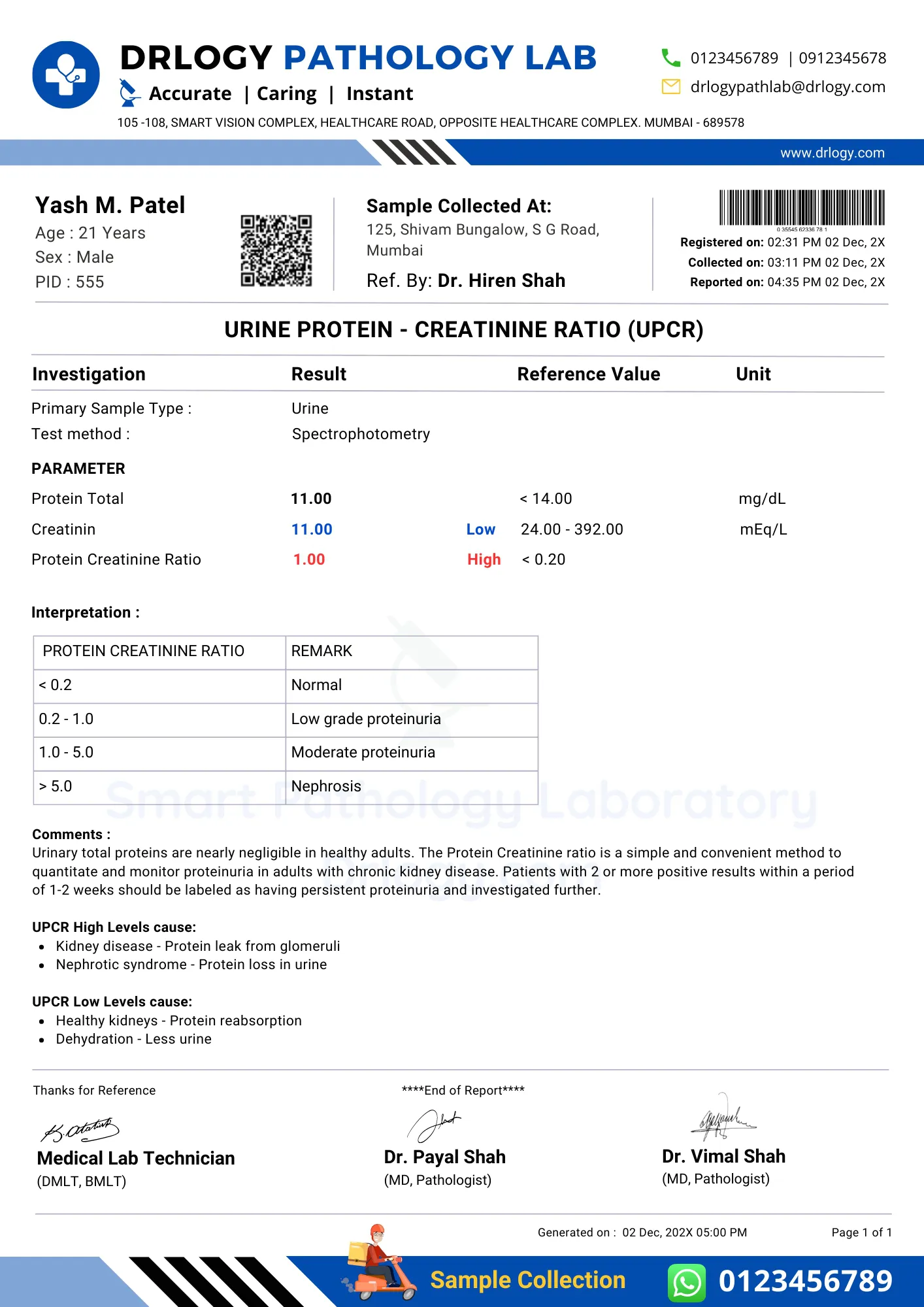
The UPCR (Urine Protein to Creatinine Ratio) Test is a simple, non-invasive test that measures the amount of protein in your urine. It is used to help diagnose kidney disease and monitor its progression.
Here are the basic details for the UPCR Test.
| Also Known As | Urine Protein to Creatinine Ratio Test |
| Type | Urine Test |
| Purpose | Amount of protein excreted in the urine |
| Sample Type | Urine |
| Preparation | No Special Preparation Required |
| Fasting | No |
| Gender | All |
| Age-Group | Any |
| Normal Value | < 0.2 mg/mg |
| Reporting Time | 1 - 2 days |
| Cost |
200 - 350 INR* |
UPCR Test Full From
The Full form of UPCR Test is Urine Protein to Creatinine Ratio Test.
UPCR is a laboratory test that measures the ratio of protein to creatinine in urine samples.
Interesting Facts About Urine Test
- Urine tests can detect various health conditions and abnormalities.
- Urine is composed of water, waste products, and dissolved substances.
- Urine color and odor can provide insights into hydration and health.
Here's the purpose of the UPCR (Urine Protein to Creatinine Ratio) test.

Here's the preparation for the UPCR (Urine Protein to Creatinine Ratio) test before, during, and after the test:
Summary
Prepare for the UPCR test by following instructions, providing a clean urine sample, and resuming normal activities afterward.
Here's the UPCR (Urine Protein to Creatinine Ratio) test procedure.
A normal UPCR level is less than 0.2 mg/mg creatinine.


UPCR Normal Test Report PDF Format

UPCR Abnormal Test Report PDF Format
Here is the UPCR test normal range.
| Age | Gender | Normal Range (mg/mg) |
|---|---|---|
| Adult | Male | < 0.2 |
| Adult | Female | < 0.2 |
| Child | < 12 years | < 0.5 |
| Adolescent | 12-18 years | < 0.7 |
Here is the UPCR test interpretation.
| UPCR Value | Interpretation |
|---|---|
| < 0.2 mg/g | Normal |
| 0.2-0.5 mg/g | Mild proteinuria |
| 0.5-1.0 mg/g | Moderate proteinuria |
| > 1.0 mg/g | Severe proteinuria |
Here is a potential cause of high UPCR levels.
| Cause | Description |
|---|---|
| Kidney disease | Protein leak from glomeruli |
| Nephrotic syndrome | Protein loss in urine |
| Diabetes | Long-term damage to kidneys |
| High blood pressure | Long-term damage to kidneys |
| Heart disease | Long-term damage to kidneys |
Here is a potential cause of low UPCR levels.
| Cause | Description |
|---|---|
| Healthy kidneys | Protein reabsorption |
| Dehydration | Less urine |
| Pregnancy | Increased protein production |
Summary
High UPCR levels indicate kidney damage or dysfunction while Low UPCR levels indicate normal kidney function.
Here are the specimen requirements for the UPCR Test.
| Specimen | Urine |
| Volume | 10 ml |
| Container | Sterile urine container |
The UPCR test is a simple, non-invasive test that does not require any needles or other invasive procedures.
Urine protein test results typically take 1 - 2 days after testing, though a 24-hour test can take a bit longer.
Here are some limitations of the UPCR Test.
Here are risk factors associated with the UPCR Test.
Here are Doctor's recommendations or consult a specialist after the UPCR Test.
| UPCR Result | Recommended Doctor | Reason |
|---|---|---|
| High levels | Nephrologist | Kidney disease or dysfunction |
| Normal levels | Primary Care Physician | Monitor overall health and further evaluation |
| Low levels | General Doctor | Routine follow-up and general medical care |
Here are the estimated UPCR Test Price in India with top different cities:
| City | Price Range (INR)* |
|---|---|
| Mumbai | 200 - 350 |
| New Delhi | 200 - 300 |
| Bangalore | 200 - 300 |
| Hyderabad | 200 - 350 |
| Kolkata | 200 - 300 |
| Pune | 200 - 300 |
| Lucknow | 200 - 350 |
| Noida | 200 - 300 |
| Surat | 200 - 300 |
| Gurugram | 200 - 350 |
| Patna | 200 - 300 |
| Chennai | 200 - 300 |
| Jaipur | 200 - 350 |
| Ahmedabad | 200 - 300 |
*Prices are approximate and vary depending on a specific laboratory or healthcare facility.
Summary
Overall, UPCR Test is a simple, non-invasive test that can help to diagnose kidney disease and monitor its progression. Also check Drlogy Test for detailed information about all medical tests for patients, doctors, scholers and medical students.
Reference
DOCTOR'S MOST TRUSTED HEALTHCARE PLATFORM
10M+Patients
30000+Doctors
25000+Hospitals/Labs